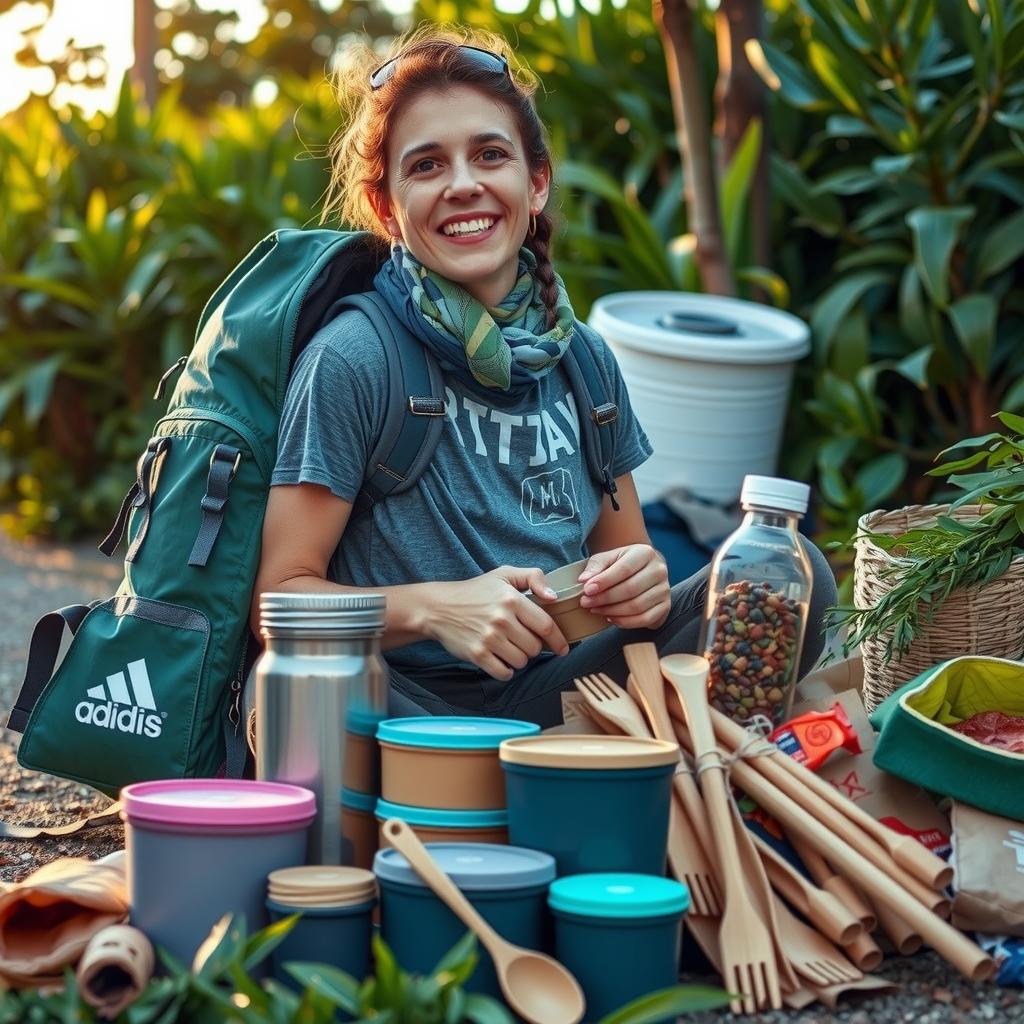As a passionate advocate for sustainable travel, I have often found myself grappling with the reality of our planet’s environmental challenges. This is where my journey as The Zero-Waste Traveler began—a commitment to minimize my ecological footprint while exploring the world. With the rise of global awareness around climate change and its impact on our environment, many travelers are seeking ways to engage in responsible tourism practices that not only enhance their experiences but also contribute positively to the places they visit. Adopting a zero-waste mindset can significantly aid in environmental impact reduction, allowing us to enjoy new cultures and landscapes without leaving behind unnecessary waste.
In this blog post, I’ll share some actionable sustainable travel tips I’ve gleaned from my experiences as The Zero-Waste Traveler. From packing an eco-friendly travel kit filled with reusable items to employing effective waste reduction strategies during your adventures, these insights will help you embrace minimal waste traveling without sacrificing enjoyment or convenience. While it may seem daunting at first, especially when navigating cultural challenges in zero-waste travel, understanding how local customs intersect with sustainability can enhance both your trip and community engagement for sustainability efforts.
Traveling should be about connection—connections with people, nature, and ourselves—and part of that involves respecting each destination’s unique ecosystem through conscious choices. As The Zero-Waste Traveler, I’ve discovered that by incorporating simple yet impactful habits into my travels—like opting for public transportation instead of renting cars or choosing accommodations focused on sustainability—I can inspire others around me to adopt similar practices. Each choice contributes towards fostering a culture of responsibility among fellow travelers while directly influencing local economies and environments.
Join me as we explore various techniques tailored for those eager to embark on their own journeys towards becoming mindful travelers committed to reducing waste. Through this exploration together under the guidance of The Zero-Waste Traveler, we will uncover practical solutions designed not just for today’s traveler but also future generations who wish to experience our beautiful planet responsibly and sustainably. Let’s dive into how we can make every trip count by embracing better habits that align with our values while enjoying all that the world has to offer!

Key points: Essential Items for a Zero-Waste Travel Kit
When preparing for my travels, I always prioritize assembling an eco-friendly travel kit that aligns with the principles outlined in The Zero-Waste Traveler. This kit typically includes reusable items such as stainless steel water bottles, cloth bags, bamboo utensils, and beeswax wraps. Each of these components plays a crucial role in minimizing waste while on the go. By having these essentials handy, I ensure that I’m equipped to make responsible choices during my journey and significantly contribute to environmental impact reduction.
Key points: Strategies for Reducing Waste in Different Travel Scenarios
One of the most effective ways I’ve found to practice minimal waste traveling is by adapting my approach based on various travel scenarios—whether I’m at hotels, dining out, or using transportation services. In line with tips from The Zero-Waste Traveler, I often bring along my own toiletries in refillable containers when staying at hotels and opt for local eateries where I can request no straws or takeout containers. When it comes to transportation, using public transit not only reduces carbon emissions but also enhances cultural immersion—a key aspect of sustainable travel tips.
Key points: Overcoming Challenges of Zero-Waste Travel in Different Cultures
Traveling through diverse cultures presents unique challenges regarding zero-waste practices. From my experiences documented in The Zero-Waste Traveler, I’ve learned that it’s essential to approach each culture with sensitivity and openness. Engaging locals about their waste reduction strategies can be enlightening; however, it’s equally important to understand their customs surrounding sustainability. Embracing cultural challenges in zero-waste travel allows me not only to adapt but also inspires conversations around responsible tourism practices that resonate within those communities.

Essential Gear for the Eco-Conscious Traveler
Elevating Your Travel Experience While Reducing Waste
When I embarked on my journey into zero-waste travel, I quickly discovered that creating an eco-friendly travel kit is both a personal commitment and a practical necessity. As someone deeply invested in environmental impact reduction, I found that having the right essentials can significantly minimize waste while satisfying my adventurous spirit. A fundamental component of this kit is reusable items, which not only help reduce single-use plastics but also promote sustainable habits. For instance, investing in a sturdy set of stainless steel or bamboo utensils has proven invaluable during meals on the go. Not only do they eliminate the need for disposable cutlery, but they also add an element of style to your dining experience—an aspect I’ve grown fond of as I explore local cuisines.
Another critical item in my eco-friendly travel kit is a refillable water bottle. With so many places now offering filtered water stations, carrying a quality bottle helps me stay hydrated without contributing to plastic pollution. This simple switch underscores one of the key waste reduction strategies: bringing your own supplies instead of relying on what’s available at tourist hotspots. Furthermore, packing cloth bags for shopping or laundry has been surprisingly effective; these bags are lightweight yet durable and can be used countless times over various trips or excursions.
It’s essential to recognize how adopting these practices aligns with responsible tourism practices that respect both local cultures and environments. For example, when traveling through areas where resources may be scarce, engaging with communities about their sustainability efforts fosters mutual respect and understanding—a crucial element in any responsible adventure! By integrating such approaches into our travels—as emphasized by authors like The Zero-Waste Traveler—we contribute positively to destination communities while minimizing our ecological footprint.
Mindful Packing Techniques
Maximizing Space While Minimizing Waste
Packing mindfully isn’t just about saving space; it’s about ensuring every item serves multiple purposes while adhering to minimal waste traveling principles. When curating my zero-waste travel essentials inspired by insights from The Zero-Waste Traveler, I’ve learned how versatile clothing choices can transform packing strategies entirely. Opting for clothes made from natural fibers allows them to breathe better during warm climates while being biodegradable at the end of their life cycle—another way we can embrace sustainability without sacrificing style.
Beyond clothing selection, using solid toiletries rather than liquids has become one of my most cherished tips for reducing waste on-the-go. Shampoos and soaps packaged minimally—or even better, bar versions—significantly lessen liquid restrictions imposed by airlines and eliminate plastic containers altogether! Moreover, considering cultural challenges in zero-waste travel often means adapting our routines based on local customs regarding hygiene products or food storage options; thus flexibility becomes paramount.
Another innovative solution involves incorporating multi-functional gear like a sarong which can serve as anything from beachwear to picnic blankets or even impromptu sunshades during day-trips—the possibilities are nearly endless! Such creativity not only contributes towards building an eco-friendly travel kit but inspires others around you when shared openly within diverse social settings along your journey—inspiring fellow travelers toward better choices too!
By intertwining practical advice with environmentally-conscious values drawn from thought leaders like The Zero-Waste Traveler, we collectively forge paths more aligned with sustainable living principles that resonate well beyond our immediate experiences—and enhance community engagement for sustainability efforts worldwide.

Effective Waste Reduction in Hotels
Transforming Hospitality into Sustainable Experiences
When we think about zero-waste travel, hotels often present a significant opportunity for reducing our environmental impact. Many travelers are unaware of the extensive practices that can be implemented by accommodations to minimize waste. One effective strategy is the use of refillable toiletry dispensers instead of single-use plastic bottles; this not only cuts down on plastic waste but also encourages guests to adopt similar habits during their stay. Additionally, I recommend looking for hotels that participate in linen reuse programs, allowing guests to opt-out of daily towel and sheet changes, which conserves water and energy while promoting responsible tourism practices.
Moreover, embracing local sourcing is another key strategy for minimizing waste in hotel dining options. By prioritizing locally-sourced ingredients, hotels can significantly reduce the carbon footprint associated with food transportation and storage. This approach not only supports local economies but also creates unique culinary experiences for guests eager to engage with regional culture. When traveling, I always seek out establishments committed to sustainability—those that align with my values as a zero-waste traveler.
Finally, having an eco-friendly travel kit at hand enhances my ability to practice sustainable travel tips effectively. Simple items such as reusable cutlery or containers can make all the difference when enjoying meals away from home or grabbing snacks from local markets without resorting to disposable packaging. Implementing these minimal waste traveling techniques ensures that my trips leave behind little more than fond memories rather than trash.
Dining Sustainably
Cultivating Culinary Consciousness
Dining out while adhering to principles of sustainability requires intentional choices rooted in community engagement and responsible consumption habits. As someone passionate about maintaining a low ecological footprint through my travels, I have discovered numerous ways restaurants can implement effective waste reduction strategies that resonate deeply with me as a zero-waste traveler. For instance, opting for restaurants that prioritize seasonal menus helps ensure freshness while mitigating unnecessary food production pressures on our planet’s resources.
Additionally, many eateries now focus on composting organic materials rather than sending them off to landfills—a crucial shift towards achieving zero-waste goals within urban environments where space constraints complicate traditional recycling efforts! Engaging patrons in understanding these initiatives fosters deeper connections between diners and chefs alike—creating a shared sense of responsibility toward environmental impact reduction.
I often carry reusable utensils and containers when dining out so I’m prepared if takeout becomes necessary during my adventures! These simple additions empower me both personally (by reducing reliance on single-use plastics) while inspiring others around me who might become curious about adopting their own zero-waste practices amidst cultural challenges inherent within different regions visited abroad.
Transportation Choices Matter
Navigating Eco-Friendly Travel Options
Transporting oneself sustainably poses its own set of challenges; however—informed decisions lead us closer towards minimal wastetravel goals! Trains offer charming alternatives compared against short-haul flights—even encouraging exploration beyond primary destinations via scenic routes without contributing heavily back onto crowded airplane schedules—which ultimately generate excess carbon emissions detrimental toward climate stability!
Furthermore—ridesharing services provide convenient means connecting tourists directly into communities where they’re visiting—often allowing passengers direct access toward exploring lesser-known locales brimming with authentic experiences waiting just outside popular tourist traps known worldwide today—all while avoiding additional vehicle usage overall across dense metropolitan areas filled bustling streets congested roadways inevitably contribute negatively against air quality levels globally too!
Incorporating public transport whenever possible remains vital—the collective effort drives positive change regarding pollution outputs linked transportation systems worldwide—and inspires individuals unfamiliarized previously learn more eco-friendly methods commuting throughout diverse regions encountered along journeys traveled far & wide together collectively striving achieve common goal: leaving nothing behind except footprints remembered fondly by those we meet along way whilst practicing mindful awareness surrounding our surroundings every step taken forward boldly embracing ideals championed consistently echoed throughout The Zero-Waste Traveler!
Embracing Local Traditions: The Heart of Zero-Waste Travel
Discovering the Connection Between Culture and Sustainability
As I embark on my journey as a Zero-Waste Traveler, I find that immersing myself in local cultures not only enriches my travel experience but also inspires sustainable practices. Each destination offers unique cultural challenges that can hinder or enhance our efforts toward minimal waste traveling. By engaging with local communities, we learn about their traditions, which often include age-old practices focused on sustainability—like using reusable bags made from natural fibers or participating in community gardens. These customs present an opportunity to adopt environmentally responsible tourism practices while allowing us to share our own insights into zero-waste travel. For instance, when visiting a bustling market in Southeast Asia, I discovered how locals prioritize bulk purchasing and packaging-free shopping. This simple yet impactful approach drastically reduces plastic waste and serves as a powerful reminder of what is possible when we align travel habits with environmental consciousness.
By integrating these cultural elements into my travels, I’m also able to inspire others towards adopting eco-friendly practices. When sharing stories about the effectiveness of waste reduction strategies encountered abroad—from composting organic matter to upcycling discarded materials—I encourage fellow travelers to consider how they can incorporate these lessons into their lives back home. It’s intriguing how many travelers are unaware of the profound impact small changes can have; bringing along an eco-friendly travel kit filled with reusable utensils and containers shows them just one way they can contribute positively during their journeys without compromising enjoyment or convenience.
Bridging Cultures Through Community Engagement
Creating Lasting Relationships for Sustainable Change
In navigating zero-waste travel, community engagement becomes essential for fostering sustainability across diverse cultures. As I explore new regions through the lens of being a Zero-Waste Traveler, it’s vital for me not only to observe but also actively participate in local initiatives aimed at reducing environmental impact. Collaborating with grassroots organizations focusing on education around responsible consumption illuminates barriers faced by residents concerning waste management—barriers that many tourists may overlook while indulging in their experiences abroad.
For example, volunteering at beach clean-ups organized by local NGOs has exposed me firsthand to both the beauty of pristine environments and the stark realities posed by pollution caused by irresponsible tourist behavior—a powerful juxtaposition indeed! Engaging directly with community members allows us all to exchange ideas surrounding innovative solutions like implementing beach recycling stations or organizing workshops on sustainable crafting methods utilizing found objects instead of single-use plastics.
This mutual exchange cultivates respect between visitors and hosts while nurturing collective responsibility towards safeguarding precious ecosystems against further degradation brought forth by unnecessary waste generation typical within tourism contexts today.
Inspiring Others: A Journey Towards Collective Responsibility
Leading by Example While Traveling Sustainably
The essence of being a Zero-Waste Traveler lies not merely within personal commitments toward minimizing one’s ecological footprint but rather extending those ideals outward—transformatively inspiring others who cross paths during your travels! It’s imperative that we act as catalysts within various tourist spheres encouraging peers through conversation around practical sustainable travel tips, including sharing success stories from other destinations I’ve visited where communities banded together successfully implemented low-impact measures embracing circular economy principles strongly rooted locally!
During group tours led under responsible tourism frameworks showcasing regional attractions steeped richly culture-wise yet intertwined seamlessly alongside conservation efforts demonstrate vividly how harmony between heritage preservation alongside modern eco-challenges can be achieved sustainably over time if embraced collectively across demographics involved thus establishing connections beyond geographical lines drawn upon maps too rigidly defined historically speaking!
Through each interaction tailored thoughtfully designed purposefully directed outreach programs developed collaboratively cultivate understanding pave pathways forward ultimately ensuring future generations inherit legacies richer vibrant preserved ecologically sound thriving world awaiting adventurous explorations ahead brimming endless possibilities continually redefined uniquely challenged consistently reshaped adapting innovations fueling aspirations driving change beckoning ever onward promise fulfilled through sheer perseverance bolstered unwavering commitment shared vision encapsulated fully nurtured embodied truly reflects spirit adventure boundless joy discovery riding waves transformation igniting passions fervently pursuing better tomorrow beginning now here today hand-in-hand journey unfolding awaits…
When I prepare for my travels, I always pack an eco-friendly travel kit that embodies the principles outlined in The Zero-Waste Traveler. Essential items include a reusable water bottle to avoid single-use plastics, stainless steel or bamboo utensils for dining on-the-go, and reusable bags for shopping or carrying snacks. Additionally, I carry a collapsible coffee cup and beeswax wraps instead of plastic wrap. These tools not only support zero-waste travel but also enhance my overall experience by allowing me to engage more thoughtfully with my surroundings.
While exploring different destinations, employing effective waste reduction strategies is crucial. In hotels, I opt-out of daily housekeeping to minimize laundry waste; instead, I use the same towel throughout my stay—a practice highlighted in The Zero-Waste Traveler. When dining out, I bring my own container for leftovers and choose restaurants that prioritize sustainable practices. For transportation, whether it’s using public transit or carpooling with fellow travelers who share similar values around minimal waste traveling, these choices significantly lower my environmental impact while promoting responsible tourism practices.
Navigating cultural challenges in zero-waste travel can be daunting yet rewarding. Many cultures have differing views on sustainability and waste management; thus engaging with local communities about waste reduction becomes essential. With insights from The Zero-Waste Traveler, I’ve learned how important it is to approach conversations respectfully—sharing ideas about community engagement for sustainability without imposing beliefs can foster understanding and cooperation among locals. By sharing stories of successful initiatives from other regions I’ve visited, we can inspire zero-waste practices that resonate well within their cultural context.
Frequently Asked Questions:
Q: What should be included in an eco-friendly travel kit?
A: An ideal eco-friendly travel kit includes a reusable water bottle, utensils (like bamboo), beeswax wraps instead of plastic wrap, a collapsible coffee cup, and reusable shopping bags—all integral components emphasized in The Zero-Waste Traveler.
Q: How can one reduce waste when staying at hotels?
A: To reduce waste during hotel stays, consider declining daily housekeeping services as recommended by The Zero-Waste Traveler, using your towels multiple times before laundering them.
Q: How do you handle cultural differences regarding sustainability while traveling?
A: Handling cultural challenges requires sensitivity; engage locals by discussing shared goals around environmental impact reduction as guided by concepts found in The Zero-Waste Traveler, fostering respect and collaboration.
